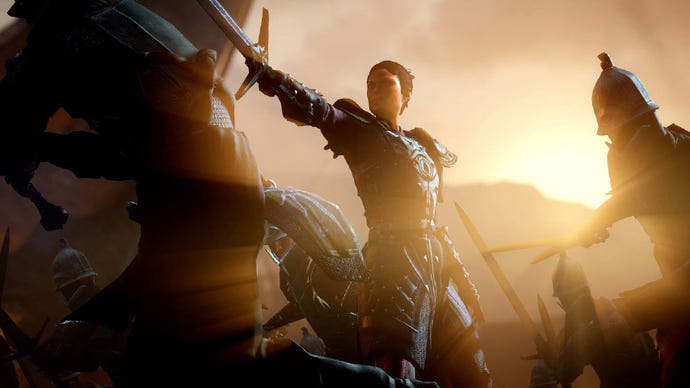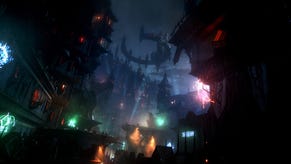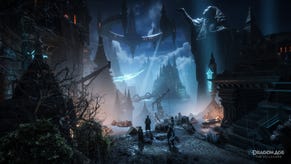The triumphant return of single-player games
Even as the Assassin's Creeds of our industry continue Frankensteining in unnecessary (if enjoyable) multiplayer suites, the single-player experience is still a big earner.
If you ever check our bylines I'm sure you're aware that I'm madly in love with Destiny. A few years ago I wouldn't touch a multiplayer game (let alone a shooter) unless it was to flick the disc into the microwave, and now here I am, a clan leader and hopeless devotee.
So imagine my surprise when, at the end of the year, I find myself cramming my Destiny chores in as quickly as possible and ignoring invitations to raid, so I can get back to Dragon Age: Inquisition.
Playing Dragon Age: Inquisition I rediscovered my love of single-player, offline games. How glorious it is to put aside time to play on my own schedule - not anybody else's. How nice it is to know my experience won't be interrupted if my modem dies, my housemate decides to download a work file, or the servers go down. How pleasant it is just to be on my own, quietly recuperating my introverted energies by pretend chatting to my many pretend romantic partners and then also blowing stuff up.
I feel like Dragon Age: Inquisition has, just by existing, struck a blow for the continued future of single-player games.
Inquisition is not the first but just the latest game to prove that single-player epics aren’t going anywhere. It’s particularly telling that producer Mark Darrah said that Skyrim changed RPGs completely.
Inquisition does, of course, have a multiplayer mode, and given how much I enjoyed Mass Effect 3's multiplayer I hope to give it a go soon. It's also not the first but just the latest game to prove that single-player epics aren't going anywhere. It's particularly telling that producer Mark Darrah said that Skyrim changed RPGs completely.
It absolutely did. Since Final Fantasy lost its edge, RPGs haven't held the sexiest position in the genre pantheon. Shooters, MMOs, and MOBAs are where it's at, it seems, drawing the biggest numbers and the biggest bucks. Skyrim, a staunchly single-player experience, proved that the genre can be an enormous seller and keep gamers involved for literally hundreds of hours on end the way multiplayer games do at their best.
A while back you would have been hard pressed to convince an executive that this was possible in the PC-centric world of WRPGs with their stats and endless chains of quests - let alone the niche appeal of JRPGs. After Skyrim, and arguably Mass Effect and a few other titles, RPGs are back in the blockbuster realm. They're back to being the kind of game someone who only buys a couple of games a year might consider grabbing. They're now the kind of project EA will delay for months, taking a financial hit in the meantime, because they're worth it.
This is a really important thing, and not just because not everybody has the kind of Internet access you need for multiplayer games, or just really prefers single-player games. It's important because single-player games with a very high level of engagement (and profitability) represent an escape from the over-connected, over-exploitative design mentality that's increasingly consuming mainstream gaming.
Have you ever wondered why everyone wants to tack multiplayer onto games that probably don't need it? Why everyone wants to make a MOBA? Why they're still looking for a Call of Duty or a World of Warcraft killer?
The answer seems obvious, right: these games make a lot of money. But it's not actually just about how much money they make, be it through cover price (Call of Duty) or microtransactions (League of Legends). It's about evolving gaming from something like a book or a movie, which you experience, into a lifestyle - something you work into your every day life. Keep the disc in the tray, and all that.
With most modern multiplayer games, you're strongly encouraged, via a variety of design tricks, to play all the time. Play every day; play every weekend. Play regularly. Stay on top of leaderboards. Be competitive. Rise through the ranks. Stay engaged with the brand.
It's not just a matter of shitty local Internet or lack of time or being anti-social; there is something glorious about a good single-player adventure.
It's much easier to achieve that through online multiplayer games, so naturally publishers are investing a great deal of resources in those kinds of games. But not everybody wants that - even if they have hundreds of hours to devote to games in a given month.
It's not just a matter of shitty local Internet or lack of time or being anti-social; there is something glorious about a good single-player adventure. The feeling of being the most important person in the world; of knowing only your actions really matter. Of being drawn into an unfolding story and exploring a world, eyes wide with wonder.
These things are possible in multiplayer games, but to me at least they don't feel the same at all. I have never played a game with optional co-op and felt any real engagement with the story; my friends have always been goofing around, impatiently insisting we skip through dialogue or cutscenes, and breaking my immersion. Here are a couple of cases in point: both Destiny and Borderlands have a much richer setting and story than many people give them credit for, because they didn't see half of it, or weren't in the right mood to experience. Just try either on your own; you'll see how different it is.
There's also something really nice about an experience that ends. The reason the classic narrative arc is so enduring in all forms of media is because it's so attractive to us as humans to have a definite beginning, middle and an end, concluding with the resolution of some sort of conflict. We love that, deep in the hindbrain; we're trained by what we consume as we grow up to find it inherently satisfying. That's something modern gaming genres don't offer, despite the best efforts of games like Titanfall to work a story in there somehow.
Dragon Age: Inquisition offers all the virtues I value in single-player games: an absorbing story, interesting characters, gameplay mechanics that encourage thought over twitch skills, and hours and hours of fun during which I can recharge my introverted energies, rather than having them drained away.
It's really important to me that these big, bold, single-player focused games continue to exist and to knock it out of the park sales-wise. It's unlikely Inquisition will make as much money as Call of Duty (nothing else in the triple-A space does), but it's probably making a bundle, and deservedly so, because its great. I'm so glad, at the end of a year of constant connected bullshittery, that we have this one little treasure to hold up in front of the industry as an example of what we want more of - and will gladly fork over cash for.












